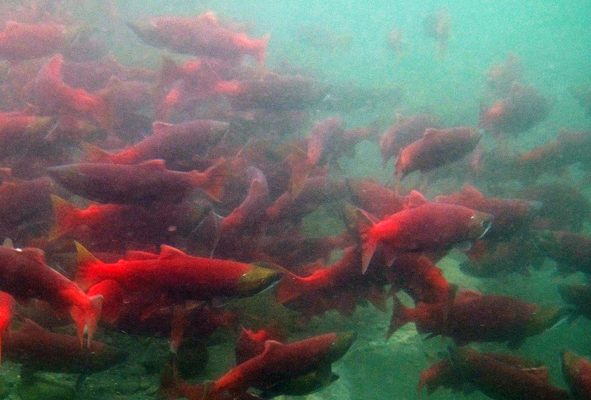
The Biden administration issued a conservation plan Thursday called “America the Beautiful.”
At 22 pages, it’s more of a statement of principles. The centerpiece is a goal of conserving 30% of the nation’s lands and waters by 2030, in part to combat climate change.
Republicans in Congress immediately criticized it as vague and an attempt to lock up natural resources.
Meanwhile, conservation groups are eyeing parts of Alaska they’d like to see protected. Their eyes are on salmon.
“It’s hard to think of two better candidates than the Tongass in Southeast Alaska and Bristol Bay in Southwest Alaska,” said Tim Bristol, executive director of Salmon State.
He said conservation measures in the Tongass and Bristol Bay would protect fish, wildlife and save thousands of jobs which depend on renewable resources.
“It just seems like they’re no-brainers. They’re places where you could make the 30-by-30 concept real and also have a real positive impact on many people’s lives,” he said.
Bristol’s group is among those campaigning to have the Roadless Rule reinstated for the Tongass. They also want the EPA to reapply Clean Water Act protection to the Bristol Bay watershed, to preclude a new permit application for the proposed Pebble Mine.
The Alaska Longline Fishermen’s Association and other groups that advocate for small-scale commercial fishermen are also joining the call to protect Bristol Bay and the Tongass.
Kelly Harrell is chief fisheries officer at Sitka Salmon Shares, a processor and direct marketer which buys from small-boat fishermen. She said Biden’s goal caused some apprehension at first.
“Initially, we and many other Alaskans and fishermen, were concerned that the 30 by 30 efforts could mean no-take marine areas and marine reserves that would exclude small boat fishermen,” she said.
But the plan shows the administration sees fishermen as stewards of the resource, she said. Harrell wants to see the administration succeed in reducing carbon emissions, in part because climate change is a threat to healthy fisheries.
“Ocean acidification, we know, is having impacts on things like our food webs in the Gulf of Alaska and the Bering Sea,” she said. “It’s a huge concern. And we need action.”
Alaska’s congressional delegation opposed the Roadless Rule and the EPA’s so-called “pre-emptive veto” when they were imposed during prior Democratic administrations.
Liz Ruskin is the Washington, D.C., correspondent at Alaska Public Media. Reach her at lruskin@alaskapublic.org. Read more about Liz here.





